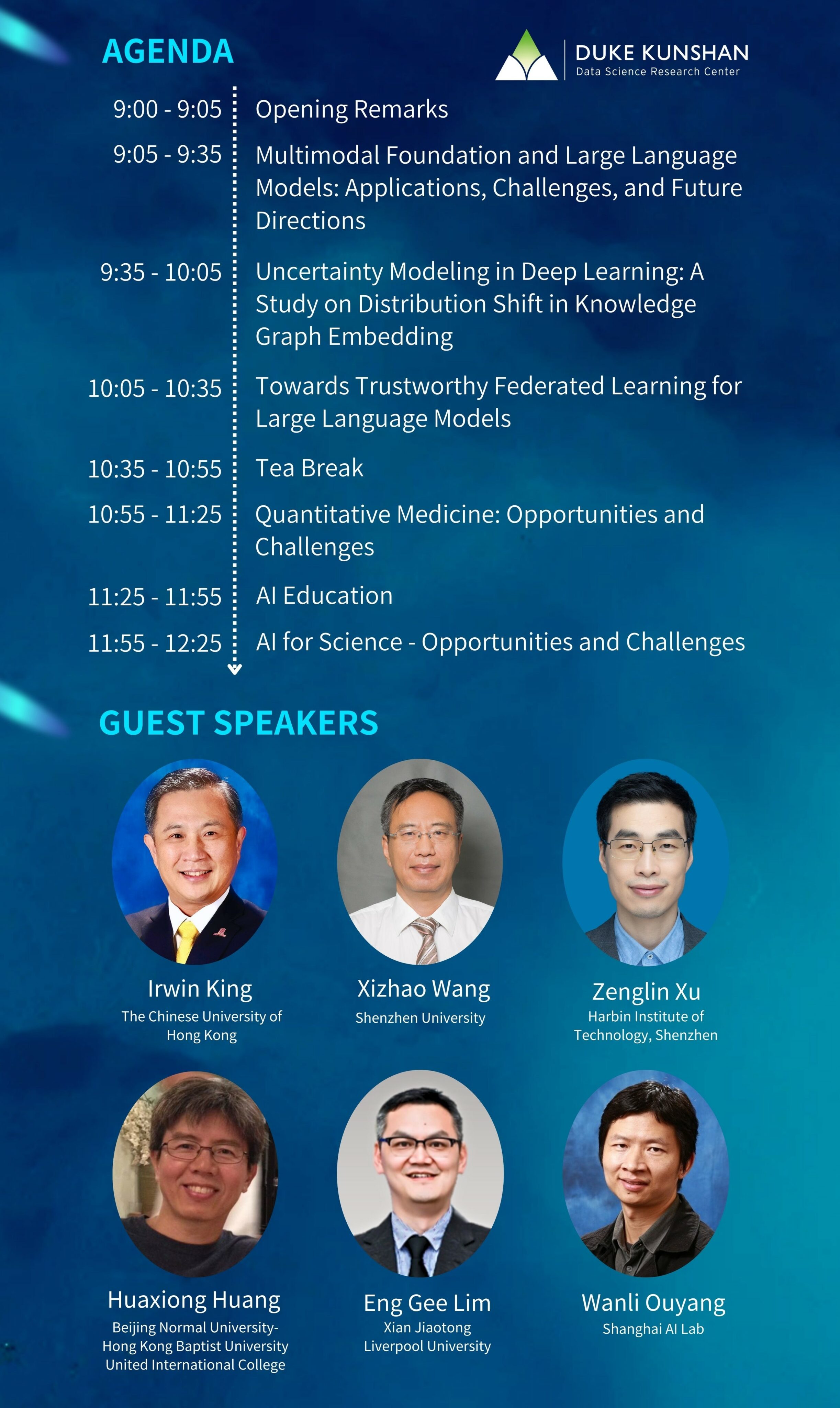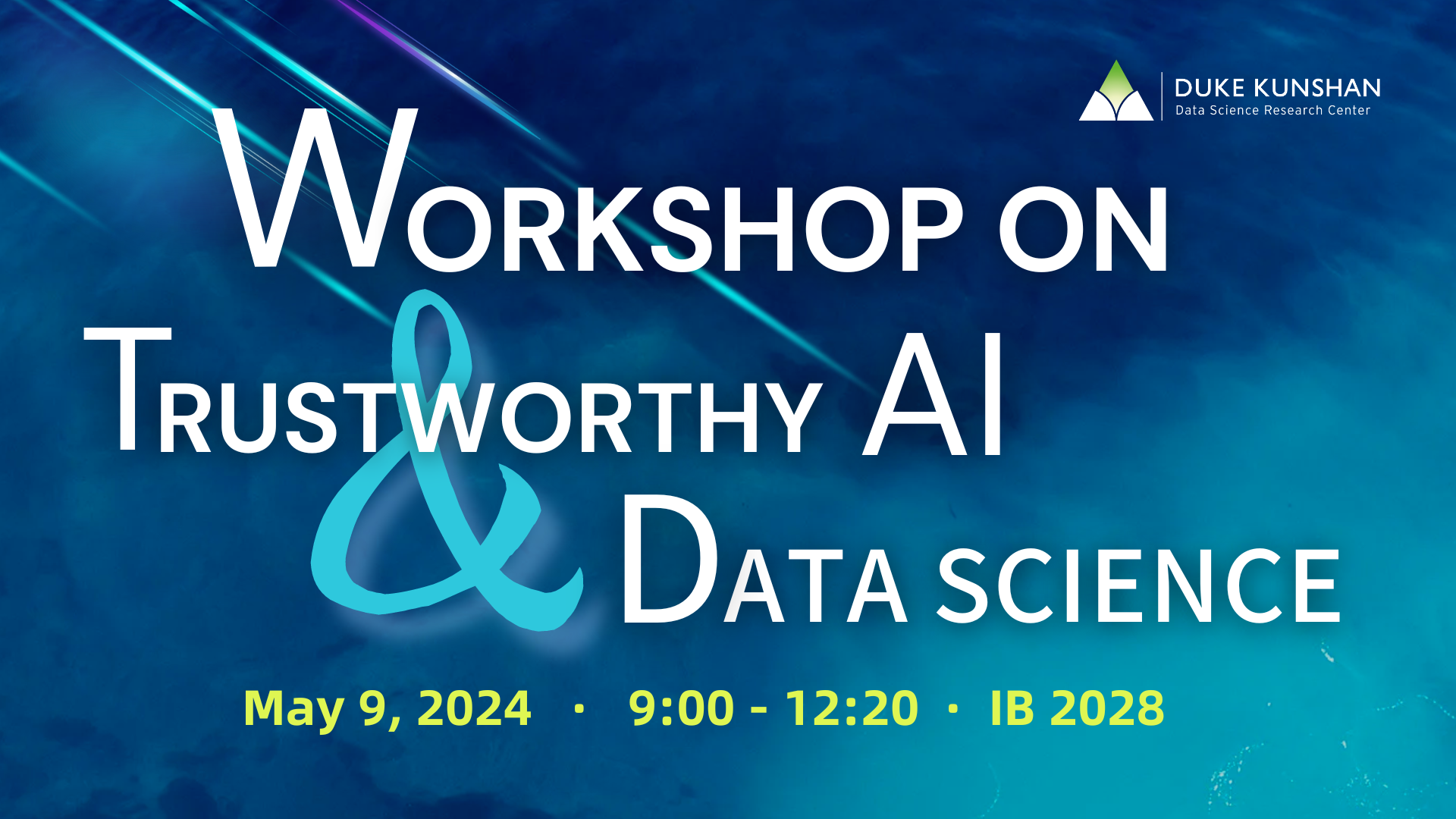This workshop brings together experts from diverse domains to delve into Trustworthy AI and Data Science. Topics our esteemed speakers will explore include multimodal foundation and large language models, uncertainty modeling in deep learning, quantitative medicine, trustworthy federated learning, AI education, and AI for science.

TALK LISTS
Multimodal Foundation and Large Language Models: Applications, Challenges, and Future Directions
Abstract:
In recent years, the field of artificial intelligence has witnessed significant advancements in multimodal foundation and large language models. This seminar presentation will provide an exploration of these models, focusing on their applications across various domains such as science, robotics, recommender systems, and watermarking. We will discuss the current trends in multimodal models, highlighting their growing importance in understanding and processing complex information. Additionally, we will delve into the challenges faced by these models, such as scalability, trustworthiness, and explore potential future directions for the field. By examining innovative approaches to improve these challenges and considering the impact of emerging technologies, we aim to inspire further research and innovation in this rapidly evolving field.
Speaker Bio:
Professor Irwin King is a distinguished professor at the Department of Computer Science & Engineering, the Chinese University of Hong Kong. His research interests span various areas, including machine learning, social computing, AI, and data mining. Professor King has published widely in top venues and serves as an editorial board member for numerous international publishers. He is the recipient of several Test of Time Awards in premier conferences and also the Dennis Gabor Award from INNS for his work in machine learning in social computing. He is a Fellow of IEEE, INNS, AAIA, and HKIE, and an ACM Distinguished Member. Professor King has held leadership roles in prominent conferences and societies. He has served as the President of the International Neural Network Society (INNS) and has taken on key positions, such as General Co-chair, for many premier international conferences. Additionally, he is the Director of the ELearning Innovation and Technology (ELITE) Centre and the Machine Intelligence and Social Computing (MISC) Lab. Professor King obtained his BS from Caltech and his MSc and PhD degrees in Computer Science from USC.
Uncertainty Modeling in Deep Learning: A Study on Distribution Shift in Knowledge Graph Embedding
Abstract:
Uncertainty modeling is a very old topic, but its integration into deep learning just starts only in recent years. This presentation briefly reviews the uncertainties in different phases of learning, from the perspectives of data, model, and prediction respectively. Focusing on the problem of distribution shift of entity feature in embedding space, we developed a module of handling uncertainty, which can be regarded as a means of data augmentation for performance promotion on inductive knowledge graph embedding tasks. Extensive experiments demonstrate that our developed model outperforms previous state-of-the-art baseline models on inductive link prediction tasks, which again confirms that the quantification of uncertainty with appropriate modeling can lead to a significant improvement of performance from the view of knowledge graph embedding.
Speaker Bio:
Xizhao Wang received his PhD from Harbin Institute of Technology in 1998. He is currently a professor at college of computer science in Shenzhen University. Previously he was the dean of computer science college in Hebei university from 2000 to 2014. Prof. Wang’s current research interests include uncertainty-aware machine learning and lightweight of large language model. He pioneered the research on Machine Learning in uncertain environment, and published several monographs and textbooks, and over 300 research papers at conferences and in journals. His works have been cited 14,178 times according to Google scholar in 2023. He was on the list of Highly Cited Researchers by Clarivate in 2019 and 2020, in recognition of exceptional research performance demonstrated by production of multiple highly cited papers that rank in the cross-field top 1%. Prof. Wang is an IEEE Fellow (2012), a CAAI Fellow (2017), and the Editor-in-Chief of Springer Journal Machine Learning and Cybernetics (from 2010 to present).
Towards Trustworthy Federated Learning for Large Language Models
Abstract: Federated Learning (FL) presents a groundbreaking approach to training machine learning models using decentralized data while enhancing privacy and security. This method is particularly advantageous for Large Language Models (LLMs) that are data-intensive and computationally demanding. By leveraging a decentralized learning framework, Trustworthy FL addresses key challenges in data privacy, security, and the utilization of distributed data sources effectively.
This presentation will begin by introducing “FedLab,” a versatile and communication-efficient FL toolkit, alongside “FedLegal,” an evaluation benchmark designed specifically for the legal sector to assess federated learning applications. Addressing the susceptibility to privacy attacks in federated learning, the talk will provide empirical evidence demonstrating FL’s effectiveness in safeguarding privacy within language models. To further enhance privacy protections against semi-honest servers, a novel neural network-based encoding aggregation method will be discussed to mitigate gradient leakage attacks. Moreover, the presentation will explore a secure multi-party computation-based solution for preserving privacy during the inference phase of language models.
Speaker Bio:
Dr. Zenglin Xu received his Ph.D. in Computer Science and Engineering from the Chinese University of Hong Kong. He is a Professor at Harbin Institute of Technology, Shenzhen, and is affiliated with Peng Cheng Laboratory. Dr. Xu has had associations with several top institutions including Michigan State University, Saarland University, the Max Planck Institute for Informatics, Purdue University, and the University of Electronic Science and Technology of China. His research focuses on machine learning and its applications in computer vision, health informatics, and natural language processing. He has published over 180 peer-reviewed papers in top AI journals and conferences. His research excellence has earned him multiple awards, such as the Outstanding Student Paper Mention at AAAI 2015, the Best Student Paper Runner-Up at ACML 2016, and the 2016 Young Researcher Award by APNNS. He serves as an Associate Editor for Neural Networks and consistently contributes as an Area Chair or Senior Program Committee member for conferences including ACL, EMNLP, AAAI, and IJCAI. Currently, he holds the position of Vice President for Education at the International Neural Network Society (INNS).
Quantitative Medicine: Opportunities and Challenges
Abstract: There has been an explosion of interest in applying quantitative methodologies in medicine. In this talk, we will discuss some of opportunities and challenges in applying data-driven approaches for identifying risk factors in various diseases, using EMR, imaging, and lab tests. We will also illustrate the advantages of approaches that combine model and data via several examples including drug efficacy and ECG reconstruction.
Speaker Bio:
Huaxiong Huang, Executive Director, Research Center for Mathematics, Beijing Normal University, and Beijing Normal University-Hong Kong Baptist University United International College. He is also a Professor at York University and the University of Toronto (status only). Prof. Huang received his BSc (Mathematics) from Fudan University and PhD (Applied Mathematics) from the University of British Columbia. His main research area is Applied and Computational Mathematics with applications in Biomedicine and other areas and published over 100 peer-reviewed journal papers. Prof. Huang is a Fellow of the Fields Institute, JSPS Fellow (University of Tokyo), Erskine Fellow (University of Canterbury) and the winner of the Industrial Mathematics Prize from the Canadian Industrial and Applied Mathematics Society and the Industrial Mathematics Outreach Prize from the Pacific Institute.
AI Education
Abstract:
The talk will focus on the significance and challenges of AI Education. It will explore the integration of AI technologies into educational systems, highlighting their potential to enhance learning outcomes and innovation. We will also discuss the need for a comprehensive approach to AI literacy, ensuring that students are equipped with the skills necessary to thrive in an AI-driven world.
Speaker Bio:
Eng Gee Lim (M’98-SM’12) received the BEng(Hons) and PhD degrees in Electrical and Electronic Engineering from UK in 1998 and 2002 respectively. Prof. Lim worked for Andrew Ltd, a leading communications systems company in the United Kingdom from 2002 to 2007. Since August 2007, Prof. Lim has been at Xian Jiaotong-Liverpool University, where he was formally the head of EEE department and University Dean of Research and Graduate studies. Now, he is School Dean of Advanced Technology, director of AI university research center and also professor in department of Communications and Networking. He has published over 200 refereed international journal and conference papers. His research interests are Artificial Intelligence, robotics, AI+ Health care, Future Education, Management in Higher Education, international Standard (ISO/IEC) in Robotics, antennas, RF/microwave engineering, EM measurements/simulations, energy harvesting, power/energy transfer, smart-grid communication; wireless communication networks for smart and green cities. He is a charter engineer and Fellow of both IET and Engineers Australia. In addition, he is also a senior member of IEEE and Senior Fellow of HEA.
AI for Science – Opportunities and Challenges
Abstract:
Artificial Intelligence (AI) has demonstrated unparalleled potential across industries and in our daily lives. In particular, AI for Science has emerged as a powerful tool for addressing complex scientific challenges by designing new AI methods. Its success in various fields such as Physics, Biology, drug design, and weather forecasting has garnered significant attention.
This talk aims to provide an introduction of the current opportunities and challenges in the field of AI for Science. Additionally, it will offer a concise introduction to our recent research endeavors on developing novel AI methods for material science, biology, and weather forecasting.
Speaker Bio:
Wanli Ouyang received the PhD degree in the Department of Electronic Engineering, the Chinese University of Hong Kong. He is now a professor at Shanghai AI Lab. His research interests include pattern recognition, machine learning, and AI for Science. Before that, he was an associate professor at The University of Sydney. He led the team winning a number of competitions and awards such as the first in 2015 and 2016 ImageNet ILSVRC Challenge. He served as the associate editor of TPAMI, IJCV and PR, the Senior Area Chair of CVPR.


